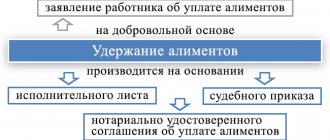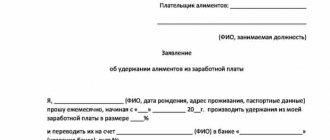Is it possible to recalculate alimony?
The obligation to support relatives who cannot provide for themselves financially arises for able-bodied citizens on the basis of the law. In the absence of initiative on the part of the potential payer, the recipient can independently initiate collection.
The law provides for the following types of collection of funds:
- through the court;
- by agreement of the parties.
If there is an agreement between the parties, obligations regarding material support must be fulfilled voluntarily. If the alimony payer or recipient does not comply with the terms of the document, then it can be sent to the FSSP for enforcement.
A court decision (writ of execution or court order) is transferred to the FSSP at the request of the recipient. Collection activities, according to the document, begin from the moment of initiation of enforcement proceedings.
Important! Recalculation of material security is possible only if the document is submitted for forced execution to the BSC.
Recalculation is carried out in the following ways:
- through the FSSP;
- through the court.
Forced collection of alimony
If the alimony payer does not fulfill his obligations to pay maintenance voluntarily, then the case is transferred to the bailiff for compulsory execution. To do this, the bailiff is given a writ of execution and a statement from the recipient of the alimony.
Based on these documents, the bailiff issues a resolution to initiate enforcement proceedings and gives the debtor time to fulfill his obligation voluntarily.
If the alimony payer fails to comply with the bailiff’s order, the documents are sent to his place of work. After receiving documents from the bailiff, the employer organization becomes obliged to withhold alimony from the earnings or other income of its employee - the debtor, and transfer it to the recipient of the alimony.
In enforcement proceedings
The basis for initiating proceedings for the forced collection of funds is a writ of execution. In this capacity, the following are used: a court decision or a notarial agreement.
The document contains the start date of payments. As a general rule, in relation to a court decision, this date is the day the application is filed with the court. The notarial agreement independently establishes the moment when payments begin.
In some cases, it is possible to recover financial support for the previous period. Funds can be withheld up to three years before the date of filing the application with the court.
The responsibility for calculating payments for the entire period of debt rests with the FSSP. If a citizen cannot pay off the accrued debt at once, then he develops a debt.
The bailiff must periodically (quarterly) recalculate the debt and collect it forcibly. The following are used as recovery measures:
- Withholding up to 70% of wages. First of all, current payments are satisfied, the rest of the amount goes to repay the debt.
- Seizure of the debtor's property. The bailiff sets a month for the citizen to repay the debt. Otherwise, the property is seized and sold.
- Seizure of a bank account. If there is a sufficient amount of funds in the citizen’s accounts, they will be written off in favor of the recipient at a time. Otherwise, all money received into the account will be transferred to the recipient until the debt is repaid.
Important! Recalculation activities are the responsibility of the bailiff. In addition, the recipient has the right to submit an application for recalculation of alimony to the bailiffs.
As a result of the recalculation, a resolution is issued indicating the new amount of debt. Based on the resolution, the bailiff can issue a certificate of the amount of the debt if the recipient wishes to collect a penalty from the alimony provider.
In addition, the applicant may request an extraordinary recalculation of the debt. The requirement is popular when going to court. Since the statement of claim must be based on current information.
Procedure for paying alimony
Alimony can be collected on the basis of a contract (agreement) on its payment, or on the basis of a court decision. The alimony agreement acquires legal force after its notarization. This document is executory. Forced collection of alimony can be carried out without going to court.
Court documents giving the right to collect alimony are:
- Court order (issued when filing an application for consideration of a case in simplified (mandatory) proceedings);
- Writ of execution (issued when filing a statement of claim for consideration of the case in ordinary (claim) proceedings).
Child support can be assigned in a fixed sum of money and as a percentage (shares) of the payer’s earnings. The payment procedure is determined by mutual agreement of the parties and is reflected in the concluded alimony agreement.
If alimony is awarded in court, the order of payments is established by the judge, taking into account how much income the alimony payer receives.
If the alimony payer has a regular income, the court orders payments as a percentage (shares) of his earnings. If the payer’s income is not constant, or he does not have an official job, receives part of the income in kind, and also in other cases provided for by the RF IC, payments are assigned in a fixed amount.
Application for recalculation of alimony to bailiffs (sample)
An application for recalculation of alimony to bailiffs can be filed by both the recipient and the debtor. A certificate about the amount of debt may be needed for a claim for the recovery of a penalty or for an application for cancellation or reduction of the amount of debt.
In addition, a popular reason for filing an application for recalculation of alimony debt is an error in the bailiff’s calculations. Since the calculation is not carried out automatically, the human factor cannot be excluded.
Sample application to the bailiff for recalculation of alimony:
- The document is drawn up in the name of the bailiff, who is in charge of the execution of the proceeding for the collection of funds. The application indicates the name of the FSSP department, its position and full name.
- The applicant provides personal information, residential address, and passport information.
- You must specify the name of the document.
- Information about enforcement proceedings. It includes details of the document on initiation of proceedings.
- The procedure and amount of collection of funds (for example, 33% of all types of income).
- Information about the reasons for recalculation (the amount of the calculated debt does not correspond to the actual one).
- Data on payments made (if the difference in amounts was due to payments about which the bailiff was not notified).
- Information about the impossibility of re-collecting paid funds.
- Requirements for the FSSP (recalculate, report the results).
- Description of the application.
- Date and signature.
A sample application for recalculation of alimony debt cannot be obtained from the FSSP. Therefore, the applicant can contact a lawyer to competently draft the petition.
The document is drawn up in two copies. One is sent to the FSSP office, the second must be signed by a specialist. The bailiff or secretary must put the date of receipt, stamp and signature on the document.
The document is subject to review within 1 month from the date of application. The result can be delivered in person, by mail or by email. Receiving an electronic version does not deprive the applicant of the opportunity to receive a paper original.
An application for recalculation of alimony debt can be downloaded here
If recalculation is refused
State structures to which you should contact in connection with the improper performance by bailiffs of their duties to recalculate children's penalties:
| №/№ | Institutions | Explanations |
| 1. | Higher bailiff | A period of 10 days is allotted for consideration. This period may be suspended if the court accepts a similar application ( Article No. 126 of the Federal Law of the Russian Federation ) |
| 2. | Judicial authority The court has 60 days to consider. In exceptional cases, the judge may extend the consideration time, but not more than 30 days. | The claim is considered within 10 days: individuals must apply to the court of general instance, and they will not have to pay tax penalties; legal entities and entrepreneurs must submit to arbitration courts |
| 3. | Prosecutor's office at the place of residence of the plaintiff | The most effective method that gives hope for a positive outcome in satisfying the claim |
| The law allows for simultaneous filing of claims with all of the above authorities | ||
Accordingly, if the management of the FSSP and the judicial authority refused to recalculate alimony, then it is necessary to contact a higher judicial authority through the court that issued the initial negative verdict.
The legislation allows exactly one month for an appeal. In practice, the appeal procedure is not so quick. Although the issue is resolved within one court hearing, the process of preparing for the hearing takes quite a lot of time:
- First, the trial court must check the complaint for compliance with the law.
- Then the document, with the case materials attached to it, is sent to the appellate authority. Complaints will be considered there for some time.
- Only then is a court date set.
Important! Writing and filing an appeal is not the only opportunity to achieve justice and defend the right to recalculate alimony. If the court refuses to appeal, then you can also file a complaint with the court of a constituent entity of the Russian Federation through the cassation procedure. And, only then, if necessary, go to the Supreme Court.
In litigation
An appeal to the court is necessary if the amount calculated by the bailiff significantly violates the legitimate interests of the recipient of the funds or the alimony. That is, it is unreasonably underestimated or overestimated.
Statement of claim for recalculation of alimony:
- The document is issued in the name of the magistrate. In addition, it is necessary to indicate the name of the court site.
- The applicant indicates personal data, address, civil passport details and contact telephone number.
- Similar information is indicated about the defendant. The debtor is indicated in this capacity.
- The price of the claim is established. The amount is calculated based on the estimated amount of unaccounted debt.
- Title of the statement.
- Information on the grounds for collecting financial support (details of the court decision, the assigned payment amount, data of the recipient, data of the child).
- Period and reasons for debt formation.
- The amount calculated by the bailiff (details of the resolution).
- Reasons why the applicant disagrees with the calculated debt (details of evidence documents).
- Your own version of debt calculation is given.
- Claims (change the amount of debt).
- Description of the application.
- Date and signature.
The statement of claim for recalculation of alimony debt can be downloaded here
The application must be:
- copies of the application;
- a copy of the applicant's civil passport;
- a copy of the court decision on the collection of financial security;
- a copy of the resolution on debt calculation;
- certificate of income of the payer;
- checks, receipts and other documents on which the recalculation request is based.
Important! The applicant has the right to hold the bailiff accountable for improper performance of duties. To do this, you must submit an application addressed to the head of the district department of the FSSP.
In addition, the interested party may go to court to challenge the decision on debt calculation. A period of 10 days is set for this.
An application to challenge the actions of the bailiff can be downloaded here
Document requirements
Depending on the chosen path for resolving claims against the amount of debt, the requirements for documents and applications will be different, depending on the place where the appeal is filed.
Application for recalculation of alimony (sample)
: Claim for recalculation of alimony debt for the past period (29.5 KiB, 191 hits)
Statement of claim to change the procedure for paying alimony and collecting alimony in a fixed amount (43.5 KiB, 127 hits)
The procedure for contacting a bailiff is of a declarative nature. For a sample application for recalculation of alimony debt, there are standard requirements for the execution of written documents to official bodies indicating the official to whom the interested party is applying and the presence at the end of a signature with the date of preparation.
A sample application for recalculation of alimony must contain:
- Information about the employee the applicant is contacting.
- Details of the person who applied.
- Information about the issuance of the current writ of execution.
- Description of the circumstances under which the rights of the applicant were violated.
- The wording of the requirements to recalculate alimony payments, with documentary evidence of the right to do so.
The bailiff considers requests not only from recipients of payments, but also from payers, if they do not agree with the current collection procedure. This happens if there are errors in the work of the bailiff, when an inflated amount is assigned for write-off, which does not comply with the norms of the law on maximum permissible deductions.
Work on recalculating new amounts is carried out quarterly, and the result of such a calculation will be a resolution to determine the current payment amount.
Complaint about the bailiff's work
Sometimes the work of FSSP employees causes complaints from both sides of the collection. Recipients complain about incorrect calculations and lack of proper attitude towards the work being performed. The payer can appeal the actions of the bailiff, qualifying them as a violation of legal human rights.
The requirements for a claim to hold a bailiff accountable for negligent attitude towards work comply with the norms of the Code of Civil Procedure of the Russian Federation, indicating the details of the parties, a description of the situation and the formulation of requirements based on the law. A complaint against a bailiff must include information about the official’s unlawful actions or refusal to recalculate alimony for the past period within its competence.
The actions of the FSSP representative can be challenged if no more than 10 days have passed since the decision was made. Since the places of residence of the recipient and the payer of alimony often do not coincide, it is necessary to take into account the place of application - this should be the district court at the location of the FSSP department where the defendant works. The trial takes quite a long time - consideration of the claim takes up to 2 months, and if new circumstances are discovered, the period is extended to 3 months.
Application for recalculation of alimony in court (sample)
In preparation for the trial, the plaintiff draws up a statement, adhering to the sample provided in court, based on the main requirements for such documents.
: Claim for recalculation of alimony debt for the past period (29.5 KiB, 191 hits)
According to Art. 131-132 of the civil procedural legislation, the mandatory details of the document are:
- exact name of the court;
- details of the parties (plaintiff and defendant);
- cost of claim;
- document's name;
- main content describing the reasons for the revision;
- clarification of the circumstances that affect the need and right to change the amounts;
- references to legislation;
- the wording of the plaintiff’s demands to determine the amount of alimony with recalculation;
- list of applications;
- signature with transcript and date.
Success in the consideration of the case depends on the competent substantiation of the claim and the provision of legislative references. The documents attached to the claim are no less important, because the court, when considering the case, will rely on the presented documentary base for a specific case.
Attached documentation
Along with the claim, a list of attached documentation is submitted to the court:
- a copy of the statement of claim for the defendant;
- a check or other payment document confirming payment of the state duty;
- a copy of the document being executed by the FSSP department;
- salary certificates from both sides;
- documents on marital status and family composition;
- the current resolution of the FSSP on calculating the amount of alimony debt;
- other documentation confirming the plaintiff’s position.
When submitting prepared documents along with the claim, you must be prepared to request additional information, as well as to present evidence from the defendant, on which the court will rely when hearing the positions.
In a fixed amount of money
The procedure for recalculating alimony for the past period is provided for by the norms of family law. If the payment is set as a fixed amount, then it is subject to regular indexation.
The amount of indexation depends on the increase in the cost of living established in the region for minors. If a subject of the Russian Federation does not establish such an indicator, then the bailiff should focus on the average cost of living in the Russian Federation.
The absence of regular indexation will lead to a decrease in the purchasing power of material support for a disabled person, which violates his legitimate interests.
How to apply
Section V of the Family Code of the Russian Federation is devoted to alimony relations, which regulates in great detail all actions related to the material support of needy disabled family members (or former family). It also pays attention to the issues of changing the amount of alimony. Dedicated to this: Art. 105, 117 and 119 RF IC.
The need to periodically adjust the amount of allowance is due to a number of reasons:
- natural inflation - the process of depreciation of money and loss of its purchasing power;
- changes in prices for goods;
- change in the financial situation of the payer;
- the emergence of new needs for the recipient of alimony (illness requiring expenses for treatment, studying at a university, acquisition of disability, loss of legal capacity);
- debt formation due to irregular payments.
As a percentage of earnings
Another recalculation option is recalculation as a percentage of all types of income of the alimony provider. This possibility is provided for in Art. 113 RF IC.
The recipient provides the accounting department of the employing enterprise or the FSSP with a certificate of the payer’s income for the previous period. The basis for recalculation is the lack of indexation of the defendant’s wages.
If the cost of living was increased, but the amount of earnings remained the same, then the employer is obliged to index the salary. As a result, the level of income increases, as a result of which the size of the payment will also increase.
During the period of time when the payer did not have official employment, recalculation is made based on the average earnings in the Russian Federation.
Financial support for disabled loved ones is determined by the parties or the court. The established amount is subject to regular change due to a decrease in the purchasing power of funds. The responsibility for conducting the recount rests with the bailiff. If the specialist does not take measures to fulfill his duties, recalculation is initiated by the recipient. Violations in calculations are appealed in court.
What should the bailiff do?
After the judge makes a decision, enforcement proceedings begin in the FSSP. It is the bailiffs who initiate measures in order to identify the place of residence of the debtor, his work and the amount of income.
Expert opinion
Sergey Nikolaevich
Judge, judicial experience - 20 years
Note! They send notifications about the debt that has arisen, deduct money from the payer’s salary, and identify additional sources of income (both official and unofficial).
If the bailiff receives a writ of execution ( IL ) for the first time, he must provide time (no more than 5 days) to the debtor to voluntarily repay the debt obligation established by the court. At the end of this period, the bailiff must redirect the document to the debtor’s place of work.
Often, wages (other income) are not enough to pay off the debt. Then the penalty is applied to the property of the alimony payer ( Article No. 112 of the RF IC ).
In order for the bailiff to calculate interest, it is necessary to file a claim for recalculation of alimony. The claim must be accompanied by a certificate stating the amount of the debtor’s income for the period of time in question.
Time limits for consideration of the case by the magistrate court
Judicial bodies operate strictly according to regulations, which are determined by the norms of current legislation. The magistrate is given:
- 5 days to make a decision on accepting the application for processing (the result is communicated to the plaintiff and defendant).
- 30 days to begin consideration (may be delayed if new or additional evidence is required).
Important! The statement of claim and package of evidence are prepared in triplicate:
- Delivered to the defendant.
- Remains in court.
- It is kept by the plaintiff.
Video about changing the amount of alimony payments.
Attention! Due to recent changes in legislation, the legal information in this article may be out of date! Our lawyer can advise you free of charge - write your question in the form below:
How to challenge a decision
There are two ways to challenge a bailiff's ruling:
By filing a complaint addressed to a superior - senior bailiff of the body in which the bailiff who made the decision on recalculation works;
In court - by appealing against unlawful actions of a representative of a government agency.
In enforcement proceedings
In enforcement proceedings, recalculation can be initiated by both the claimant and the payer. It is enough to submit an application in any form, but in compliance with the details established for official documents:
- indicating the name of the regional branch of the FSSP;
- institution addresses;
- position and full name of the bailiff;
- Full name of the applicant;
- address and contact details of the submitter;
- a statement of the essence of the application and the reasons for its submission;
- attachment of documents confirming the validity of the requirements;
- date;
- personal signature.
There are no strict requirements for the structure and content of the application. It is desirable that it be compiled without grammatical errors, with references to the norms of current legislation.
Statement of claim to court
An application can be submitted to the court, bypassing an application to the FSSP, but usually, such applications are the final stage of resolving a conflict of interests of the parties, when all other ways to resolve the dispute peacefully have been exhausted, and the debtor does not want to pay alimony.
You can fill out an application yourself and pay the state fee using the sample:
But it is better to contact a family law attorney who has experience in resolving similar conflicts.
Application to the bailiffs
Despite the absence of strict requirements for drawing up an application, it is better to be guided by a template that has been developed in practice:
Expert opinion
Gusev Ilya Anatolievich
Practicing lawyer with 10 years of experience. Specialization: family law. Knows everything about the law.
It should be remembered that the applicant must have in his hands a copy of the application with a mark from the FSSP office about acceptance of the application or a postcard from the Russian Post with the signature of the recipient. If the application is sent by mail
Arbitrage practice
Litigation over child support obligations is very common. Moreover, they are equally aimed at increasing the amount of payments - on the part of the claimant, and at reducing - on the part of the payer.
Usually, the entire array of disputes is periodically summarized in information bulletins of regional/territorial courts, and on the basis of these generalizations, the Supreme Court of the Russian Federation issues guiding documents that are mandatory for judges at lower levels of the judicial system.
An example of a generalization of such practice is the analysis of cases on alimony obligations of the Saratov Regional Court:
The multi-page document covers all options for complaints and statements filed regarding disputes regarding the payment of alimony, including recalculation.
Filing an application is a simple action that can be done without the involvement of qualified legal assistance and does not require financial investments if the dispute over the amount of alimony does not develop into litigation.
Alimony obligations and issues related to them are among the most problematic in the practice of bailiffs. To avoid additional disputes, the legislator regulates in detail the procedure for accrual, release and termination of financial support for disabled loved ones.
Let's take a closer look at how to initiate recalculation of alimony payments for the past period.
Recalculation of alimony debts
If a situation occurs where a reduction is necessary for debts accumulated during the time when the payer is physically unable to pay alimony, the payer should also go to court. At the meeting, the current and past amounts of the minimum finance for living in the region, the amount of income of the payer will be considered.
The amount of payments can be reduced by a court decision, but the payer will only be able to obtain a positive response from the judges in cases of extreme need. The state remains on the side of the child and the recipient of funds, so judges will make concessions only if there is irrefutable evidence of a deterioration in the financial situation of the payer. Alimony obligations are considered the most important of all that citizens have, for example, debts on loans or utility bills. In most cases, alimony is indexed and payments are increased; only full confirmation of the need to recalculate will help reduce the amount of alimony.








